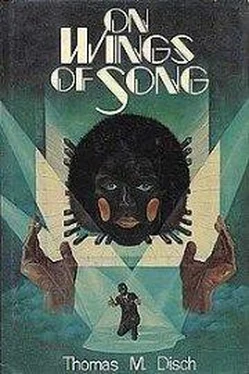Actually, notwithstanding his grand renunciation of all beaux arts and belles lettres , Daniel was rather proud of his graffiti, some of which were good enough to have been remembered and copied out, by other hands, in public conveniences all about the city. Each time he found one thus perpetuated, it was like finding a bust of himself in Central Park, or his name in the Times — proof that he’d made his own small but characteristic dent on the bumpers of Western Civilization.
On 11th Street, halfway to Seventh Avenue, Daniel’s antennas picked up signals that said to stop and reconnoiter. A few housefronts away, on the other side of the street, three black teenage girls were pretending to be inconspicuous in the recessed doorway of a small apartment building. A nuisance, but Daniel had lived long enough in New York to know better than ignore his own radar, so he turned round and took his usual route to the gym, which was shorter anyhow, along Christopher Street.
At Sheridan Square he stopped in for his traditional free breakfast of a glop-filled doughnut and milk at the Dodge ’Em Doughnut Shop. In exchange Daniel let the counterman use the gym on nights that he was in charge. Larry (the counterman) complained about his boss, the customers, and the plumbing, and just as Daniel was leaving he remembered that there’d been a call for him the day before, which was a bit strange since Daniel hadn’t used the doughnut shop phone as an answering service for over a year. Larry gave him the number he was supposed to call back: Mr. Ormund, extension 12, 580-8960. Maybe there’d be money in it, you never can tell.
Adonis, Inc., across Seventh Avenue from the doughnut shop and upstairs above a branch of Citibank, was the nearest thing Daniel had to a permanent address. In exchange for handling the desk at different times and locking up three nights a week, Daniel was allowed to sleep in the locker-room (or, on the coldest nights, inside the sauna) whenever he cared to. He kept a sleeping bag and one change of clothes rolled up in a wire basket, and had his own cup with his name on it — BENNY — on a shelf in the bathroom. Two other temps also had cups on the shelf and sleeping bags in their lockers, and when all three of them slept over it could get pretty claustrophobic. Fortunately, they seldom all three coincided on the same night, since there were usually other, less spartan possibilities. At irregular but cherished intervals Daniel would be asked to act as watchdog for someone’s vacant apartment. More often he’d spend the night with a known quantity from the gym, such as, last night, Jack Levine. Once or twice a week he’d take pot luck from the street. But there were nights when he didn’t care to pay the price for such extra comfort, and on those nights it was good to have the gym to fall back on.
There were basically two classes of people who worked out at Adonis, Inc. The first were show biz types — actors, dancers, singers; the second were policemen. It could be argued that there was a third class as well, larger than either of the others and the most faithful in attendance — the unemployed. But almost all of these were either unemployed show biz types or unemployed cops. It was a standing joke at the gym that these were the only two professions left in the city. Or, which was nearly the case, the only three.
Actually, New York was in much better shape than most of the other collapsing East Coast cities, since it had managed over the last fifty years to export a fair share of its problems by encouraging the more energetic of these problems to lay waste the slums they lived in and loathed. The Bronx and most of Brooklyn were rubble now. No new housing was built to replace the housing burned down. As the city shrank, its traditional light industries followed the Stock Exchange to the southwest, leaving behind the arts, the media, and the luxury trade (all three, paradoxically, in thriving condition). Unless you could get on the welfare rolls (or were an actor, singer, or policeman), life was difficult verging on desperate. Getting on welfare wasn’t easy, since the city had slowly but systematically tightened the requirements. Only legal residents qualified for welfare, and you only got to be a legal resident if you could prove you’d been profitably employed and paying taxes for five years or (alternately) that you were a graduate of a city high school. Even the latter proviso wasn’t without a tooth or two, for the high schools no longer acted simply as part-time penitentiaries, but actually required students to master a few rudimentary skills, such as programming and English grammar. By these means New York had reduced its (legal) population to two and a half million. All the rest (another two and a half million? If the authorities knew, they weren’t telling) were temps, and lived, like Daniel, as best they could — in church basement dormitories, in the shells of abandoned midtown offices and warehouses, or (those with some cash to spare) in federally subsidized “hotels” that provided such amenities as heat, water, and electricity. In his first years in New York, before money became the overriding consideration (for Boa, providentially, had brought along in her hand luggage what had seemed a lifetime’s supply of pawnable jewelry — until it had all been pawned), Daniel had lived at such a hotel, sharing a semi-private room with a temp who worked nights and slept days. The Sheldonian, on Broadway at West 78th. He’d hated the Sheldonian while he was there, but those days were far enough behind him now to look like the Golden Age.
It was still relatively early when he arrived at the gym, and the manager, Ned Collins, was setting up a routine for a new customer, a fellow Daniel’s own age but badly gone to seed. Ned bullied, exhorted, and flattered in exquisite proportion. He would have made — he did make — a first-rate psychotherapist. No one was better at flogging someone through a crisis of morale or at goosing them out of the doldrums. Ned, and the feeling he generated of basic psychological comfort, was the main reason Daniel had made Adonis, Inc., his home.
After he’d swept the hallway and the stairs, he started to work on his own routine, and after a hundred incline situps, he had shifted down to first gear — a mood, or mode, of slow, thoughtless strength, such as derricks must feel when they’re most happy. Ned hectored the new customers. The wind rattled the windows. The radio played its small repertory of tunes for the brain-damaged and then delivered a guileless, Pollyanna version of the news. Daniel was too self-involved to be bothered. The news floated by like noise from the street, like faces drifting by outside a restaurant: signs of the city’s teeming life, welcome as such, but all homogenized and indistinct.
After an hour and a half he laid off and took over the desk from Ned, who left for lunch. When he was sure no one on the floor of the gym was watching, Daniel took the key-ring from the drawer and went into the locker-room where he opened the coin box of the pay-phone. With a quarter from the box, he dialed the number Larry had given him.
A woman answered: “Teatro Metastasio. May I help you?”
The name set off all his alarm bells, but he answered, calmly enough: “Yes. I have a message to call Mr. Ormund, on extension 12.”
“This is extension 12, and this is Mr. Ormund speaking.”
“Oh.” He skated past his double-take without skipping a beat. “This is Ben Bosola. My answering service said I was to phone you.”
“Ah yes. There is a position open here at the Teatro that a mutual friend said you would be qualified to fill.”
It had to be a practical joke. The Metastasio was, more than La Fenice, more than the Parnasse in London, the source, mainstay, and central glory of the bel canto revival. Which made it, in many purists’ eyes, the most important opera house in the world. To be asked to sing at the Teatro Metastasio was like receiving a formal invitation to heaven.
Читать дальше












